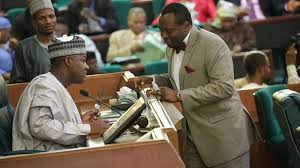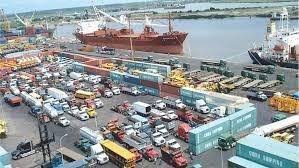News
Four Internet Fraudsters Get Jail Sentences In PH

A Federal High Court sitting in Port Harcourt and presided over by Justices P. I. Ajoku, P. I. Ayua and S. I. Mark has convicted and sentenced four middle aged men to various jail terms over their involvement in fraud.
The convicts who bagged various jail terms on Wednesday are Daniel Ebubechi Chinweobo, Timi Olamide Samuel, Chibueze Thaddeus Ugochukwu and Emmanuel Linus. The four are currently being remanded at the Port Harcourt Correctional facility until their bail conditions are met.
Separate charges bordering on impersonation, Advance Fee Fraud and obtaining money under false pretence were levied against the convicts by the Port Harcourt Zonal Directorate of the Economic and Financial Crimes Commission (EFCC).
The charge against Chinweobo reads: “That you, Daniel Ebubechi Chinweobo (a.k.a. Philip James) sometime in 2024, in Port Harcourt, within the jurisdiction of this Honourable Court, fraudulently obtained the sum of One Thousand Great Britain Pounds (£1,000 only), from Marinela Gabriela, a Caucasian American, when you represented yourself to be Philip James, a military man from California, serving in Syria, who pretended to be in a marital relationship with Marinela Gabriela, which pretext you knew to be false and thereby committed an offence contrary to Section 1 (1) (b) of the Advanced Fee Fraud and Other Fraud Related Offences Act, 2006 and punishable under Section 1 (3) of the same Act.”
That of Ugochukwu reads: “That you, Chibueze Thaddeus Ugochukwu, on or about the 14th day of May, 2025, at Alakhahia axis of Port Harcourt, within the jurisdiction of this Honourable Court, fraudulently obtained from one Grey the sum of Eight Hundred United States of America dollars ($800 only), under the false pretence that you are the Amanda Pappers, a citizen of the United States of America which pretence you knew to be false and thereby committed an offence contrary to Section 1(1)(a) of the Advance Fee Fraud Related Offences Act 2006 and Punishable under Section 1(3) of the same Act.”
They all pleaded ‘guilty’ to their charges, following which prosecution counsel A. Chukwuegwu and G. C Ngborokwu, tendered incriminating documents in evidence against them and urged the courts to convict and sentence them accordingly.
The Defence counsels, G. N. Chukwu, Yemi Ogunleye, A. O. Secondus and Chigozie Umunnakwem on their part, prayed the courts to temper justice with mercy on the ground that the defendants were first time offenders.
Justice Ajoku, however, convicted and sentenced Chinweobo and Linus to 30 months imprisonment each at the Port Harcourt Correctional Centre, or to pay N200,000 respectively.
Their sentences are to run concurrently and began from the date of their arrest.
Justice Ajua convicted and sentenced Ugochukwu to one year jail term or to pay 50,000 fine, while Justice Mark convicted and sentenced Samuel to two years in prison or to pay N900,000 fine.
In addition to their jail terms, the convicts were asked to depose to affidavit of good behaviour and forfeited a Techno mobile phone, a Samsung Galaxy phone, iPhone 13 Pro, iPhone X, iPhone 16 Pro, an iPad and Lexus ES 350, recovered from them at the scene of their arrest to the Federal Government.
The convicts’ journey to the correctional centre began with their arrest by the EFCC in April 2025, following credible intelligence that exposed their fraudulent internet activities in Port Harcourt.
King Onunwor
News
NUPRC Unveils Strategies To Boost Oil Sector

The Nigerian Upstream Petroleum Regulatory Commission (NUPRC) has flagged inefficiencies and overlapping regulations as major obstacles to growth in Nigeria’s upstream oil and gas sector.
The Tide source reports that other challenges are opaque fiscal structures and weak investor confidence.
NUPRC Chief Executive, Mr Gbenga Komolafe, outlined these challenges at the Nigerian Association of Petroleum Explorationists (NAPE) golden jubilee lecture in Lagos, yesterday.
Komolafe spoke on: ‘Evolution of Oil and Gas Regulation in Nigeria: Opportunities, Achievements, and Regulatory Strategies for Upstream Resource Optimisation.’
He that lengthy approvals and uncompetitive regulations hinder resource exploitation.
He traced sector development to the Petroleum Act of 1969, which initially provided structure but became outdated over the decades.
This, he said, changed with the 2021 Petroleum Industry Act (PIA), which brought new governance, fiscal reforms, and institutional realignment.
According to him, the PIA shifted Nigeria from static regulation to dynamic, investor-focused governance anchored on transparency and global competitiveness.
The Act also created NUPRC as a forward-thinking regulator tasked with positioning Nigeria as a world-class upstream oil and gas jurisdiction.
Komolafe commended NAPE at 50, describing it as a pillar of geoscientific excellence and a vital bridge between academia, government, and the energy sector.
The anniversary theme, ‘NAPE @ 50: Pioneering the Future of Energy in Africa,’ reflects a drive to build a resilient and innovative energy future.
Under his leadership, NUPRC has issued 19 PIA-aligned regulations, matching global standards and fostering a stable environment for investors.
He said the Commission has also launched a Regulatory Action Plan (RAP) within its 2023–2033 Strategic Plan to remove bottlenecks and speed up licensing.
The RAP seeks to regain Nigeria’s upstream investment share, which fell from 44 per cent in 2014 to 30 per cent in 2022.
Komolafe noted that NUPRC has integrated data intelligence and digital tools into upstream operations to boost efficiency and investment decisions.
He said the revitalised National Data Repository—Africa’s largest petroleum data bank—offers high-quality geoscientific data, advanced seismic analysis, and improved exploration de-risking.
Recent bid rounds, including the 57 Petroleum Prospecting Licences in 2022 and the 2024 Licensing Round, were marked by transparency and competitiveness.
“Fiscal reforms, such as competitive royalties and tax incentives, have further enhanced project viability,” Komolafe added.
Through the Project One Million Barrels Initiative, launched in 2024, Nigeria targets raising output from 1.46 million to 2.5 million barrels per day by 2026.
Current production, he noted, averages between 1.7 million and 1.83 million barrels per day.
Security measures include approving 37 new evacuation routes and partnering with security agencies to curb crude theft.
The Domestic Crude Supply Obligation policy ensures steady refinery feedstock, strengthening domestic supply chains and resilience.
On development, Komolafe said the Host Community Development Trust, managed via the HostComply platform, promotes transparency and reduces conflicts in host communities.
He added that NUPRC’s digital transformation aims to streamline regulation, enhance investor clarity, and deliver smarter, faster oversight.
News
Military Kills Terrorist Commanders, Rescue 37 Victims – DHQ
The Defence Headquarters says troops eliminated several terrorist commanders, rescued 37 kidnapped victims, and apprehended dozens of suspects in nationwide operations between Aug. 7 and Aug. 13.
The Director of Defence Media Operations, Maj.-Gen. Markus Kangye, said this in Abuja, yesterday during the biweekly news briefing on military activities across all theatres of operation.
He said the operations were carried out under the Joint Task Forces in the North-East, North-West, North-Central, South-East, and South-South, with combined air and ground assaults supported by sister security agencies and hybrid forces.
“Our troops have continued to demonstrate courage, resilience, and determination to dismantle terrorist networks, defeat insurgency and banditry, and suppress all forms of criminality.
“The terrorists’ will to fight has been shattered,” he said.
In the North-East, Kangye said the troops of Operation Hadin Kai, neutralised several Boko Haram and ISWAP commanders in Limankara, Pulka, Kareto, and other locations in Borno, Adamawa, and Yobe States.
He said that 16 suspected terrorists were arrested, five hostages rescued, and weapons, vehicles, motorcycles, and improvised explosive devices (IEDs) recovered and safely detonated.
In the North-West, Kangye said the troops of Operation Fasan Yamma, killed scores of terrorists, arrested 11 suspects, and rescued 17 kidnapped victims in Katsina, Sokoto, Zamfara, Kebbi, and Kaduna States.
According to him, a suspected gunrunner was intercepted in Jama’a Local Government Area of Kaduna State, while concealing an AK-47 rifle and ammunition in a sack of animal feed.
In the North-Central, he said the troops of Operation Whirl Stroke engaged criminal gangs in Benue, Taraba, Kogi, and the FCT, killing several, arresting 13 suspects, and rescuing nine hostages.
According to him, two notorious arms dealers were arrested in Lokoja, while a large cache of ammunition was recovered from an abandoned extremist camp in Taraba.
In the South-South, Kangye said the troops of Operation Delta Safe impounded 24,575 litres of stolen crude oil, 9,140 litres of illegally refined diesel, and 2,605 litres of petrol.
He added that the troops destroyed illegal refining sites, seized boats and storage tanks, and arrested 34 suspects linked to oil theft, cultism, and kidnapping.
In the South-East, he said the troops of Operation UDO KA, nabbed six suspected IPOB/ESN members and a kidnapper in Imo, Anambra, and Ebonyi States, recovering arms, ammunition, and vehicles.
Kangye, however, dismissed an Amnesty International report alleging extrajudicial killings in the South-East, insisting that the military operates professionally and within the law.
“The Armed Forces of Nigeria are not involved in any extrajudicial killings. Such allegations are unfounded and misleading,” he said.
Kangye urged Nigerians to appreciate the sacrifices of the troops in the field, adding that the “troops gave their today for a safer country of tomorrow’’.
News
Tinubu Deserves Credit For Stabilising Economy – Okonjo-Iweala ?

Dr Ngozi Okonjo-Iweala, the Director-General of the World Trade Organization, (WTO,), says President Bola Tinubu deserves credit for stabilising Nigeria’s economy through bold reforms.
?
She spoke with State House correspondents on Thursday after a closed-door meeting with the President at the Presidential Villa, Abuja.
?
?Okonjo-Iweala noted the government’s efforts to steady the economy as a key step in building long-term growth.
?
?”The president and his team have worked hard to stabilize the economy and you can’t really improve an economy unless it’s stable.
?
?“He has to be given the credit for the stability of the economy, so the reforms have been in the right direction,”
?
?She emphasised that stabilising the economy is only the beginning of a broader recovery agenda.
?
?The WTO boss however stressed that more work is needed to stimulate inclusive growth and alleviate poverty in the country.
?
?“What is needed next is growth. We now need to grow the economy and we need to put in social safety nets so that the people who are feeling the pinch of the reforms can also have some support to be able to weather the hardship.
?
?“That’s the next step, how do we build social safety nets to help Nigerians cushion the hardship they are feeling and how do we grow the economy so we can create more jobs and put money in people’s pockets? These are issues we discussed with the President.”
?
?She stressed the need for policies that directly impact the lives of Nigerians and create economic opportunities.
?
?Okonjo-Iweala assured of the WTO’s continued support for Nigeria’s economic revival.
?
?The meeting signals continued collaboration between the Tinubu-led government and international partners to drive economic recovery.
The Tide source reports that the World Bank acknowledges that Nigeria’s economy is stabilising under President Tinubu’s administration, with projected growth of 3.6 per cent in 2025.
This positive outlook is attributed to macroeconomic reforms, particularly in the petroleum, foreign exchange, and power sectors, which are creating a more stable business environment.
While inflation remains a challenge, the World Bank noted that the reforms were yielding positive results, including a significant increase in national revenue and a reduction in the fiscal deficit.
-

 Politics4 days ago
Politics4 days ago2027: Nigerians Victims Of Desperate Politicians – Cleric
-

 Business4 days ago
Business4 days agoCBN Comptroller Warns Against Naira Sale
-

 Politics4 days ago
Politics4 days agoObasanjo, Tinubu Mourn Audu Ogbeh’s Death @78
-

 Politics4 days ago
Politics4 days ago2027: APC Woos Enugu Gov
-

 Maritime4 days ago
Maritime4 days agoMWUN, Police Parner In Safer Port Operations
-

 Business4 days ago
Business4 days agoReal Estate GDP Contribution Surges To N41.3tn
-

 Business4 days ago
Business4 days agoFreight Forwarders Raise Alarm Over Govt Reforms Sabotage
-

 Niger Delta4 days ago
Niger Delta4 days agoC’River Communities Seeks Govt Intervention In Humanitarian Crisis

